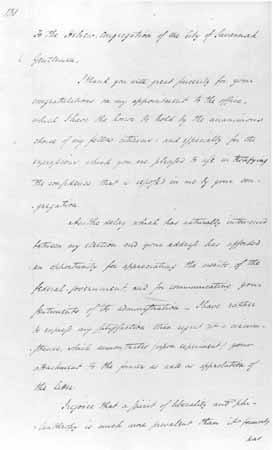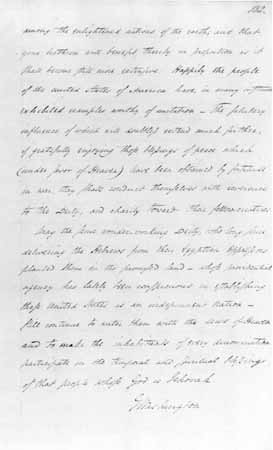"To Bigotry No Sanction": The Father of His Country
A special prayer in Hebrew and English for the United States and "His Excellency George Washington, Captain, General and Commander in Chief of the Federal Army of these States," was read by the Reverend Gershom Mendes Seixas at the Consecration Service of the new synagogue of Congregation Mikveh Israel, in Philadelphia on April 3, 1782. Seven years later, Washington, now the newly elected president of the United States, was again the recipient of expressions of adulation and felicitations from American Jewish congregations. In the Washington Papers at the Library of Congress are the original addresses to him from the Hebrew Congregation in Newport, Rhode island, and the Hebrew Congregations in Philadelphia, New York, Charleston, and Richmond. Also present are the retained copies of the president's replies to them and to the Hebrew Congregation of the City of Savannah. These are but the first of a large number of letters from Jewish organizations and from individual Jews to and from American presidents in the Library of Congress, which is the depository of the papers of all the presidents from George Washington to Calvin Coolidge, with the exception only of John Adams. Some such letters in the papers of Washington, Jefferson, Madison, and Lincoln should be allowed to speak for themselves.
The first Jewish community to address the newly elected George Washington was the Hebrew Congregation of Savannah, Georgia, on May 6, 1789. "Our eccentric situation," Levi Sheftal writes in behalf of the congregation, "added to a diffidence founded on the most profound respect has thus long prevented our address." The congregation declares itself beholden to Washington for his "unexampled liberality and extensive philanthropy [which] have expelled that cloud of bigotry and superstition which has long, as a veil, shaded religion-unrivetted the fetters of enthusiasm enfranchised us with all the privileges and immunities of free citizens, and initiated us into the grand mass of legislative mechanism."
Washington's reply states:
Gentlemen:-I thank you with great sincerity for your congratulations on my appointment to the office which I have the honor to hold by the unanimous choice of my fellow citizens, and especially the expressions you are pleased to use in testifying the confidence that is reposed in me by your congregation ...
I rejoice that a spirit of liberality and philanthropy is much more prevalent than it formerly was among the enlightened nations of the earth, and that your brethren will benefit thereby in proportion as it shall become still more extensive; happily the people of the United States have in many instances exhibited examples worthy of imitation, the salutary influence of which will doubtless extend much farther if gratefully enjoying those blessings of peace which (under the favor of heaven) have been attained by fortitude in war, they shall conduct themselves with reverence to the Deity and charity toward their fellow- creatures.
May the same wonder-working Deity, who long since delivered the Hebrews from their Egyptian oppressors, planted them in a promised land, whose providential agency has lately been conspicuous in establishing these United States as an independent nation, still continue to water them with the dews of heaven and make the inhabitants of every denomination participate in the temporal and spiritual blessings of that people whose God is Jehovah.
G. Washington.
|
|
After seven months of planning, on December 13, 1790, Manuel Josephson, president of Philadelphia's Mikve Israel, wrote in behalf of the Hebrew Congregations of Philadelphia, New York, Charleston, and Richmond:
Sir:-It is reserved for you to unite in affection for your character and person every political and religious denomination of men; and in this will the Hebrew congregations aforesaid yield to no class of their fellow- citizens.
... The wonders which the Lord of Hosts hath worked in the days of our Forefathers, have taught us, to observe the greatness of His wisdom and His might throughout the events of the late glorious revolution; and while we humble ourselves at His footstool in thanksgiving and praise for the blessing of His deliverance; we acknowledge you, the Leader of American Armies, as his chosen and beloved servant; But not to your sword alone is present happiness to be ascribed; that, indeed, opened the way to the reign of Freedom, but never was it perfectly secure, till your hand gave birth to the Federal Constitution, and you renounced the joys of retirement to seal by your administration in Peace what you had achieved in war.
To the eternal God, who is thy refuge, we commit in our prayers the care of thy precious life; and when, full of years, thou shalt be gathered unto thy people, thy righteousness shall go before thee, and we shall remember, amidst our regret, "that the Lord hath set apart the godly for himself," whilst thy name and thy virtues will remain an indelible memorial on our minds.
Manuel Josephson.
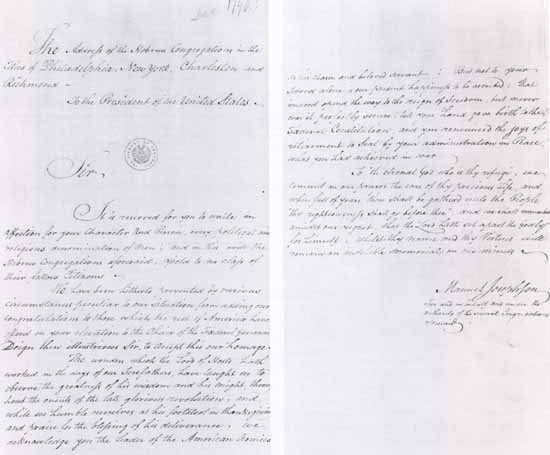 |
To which Washington replied:
To the HEBREW CONGREGATIONS IN THE CITIES OF PHILADELPHIA, NEW YORK, CHARLESTON, AND RICHMOND.
Gentlemen:-The liberality of sentiment toward each other, which marks every political and religious denomination of men in this country, stands unparalleled in the history of nations.
The affection of such a people is a treasure beyond the reach of calculation, and the repeated proofs which my fellow-citizens have given of their attachment to me and approbation of my doings form the purest source of my temporal felicity.
The affectionate expressions of your address again excite my gratitude and receive my warmest acknowledgment.
The power and goodness of the Almighty, so strongly manifested in the events of our late glorious revolution, and His kind interposition in our behalf, have been no less visible in the establishment of our present equal government. In war He directed the sword, and in peace He has ruled in our councils. My agency in both has been guided by the best intentions and a sense of duty I owe to my country.
And as my exertions have hitherto been amply rewarded by the approbation of my fellow citizens, I shall endeavor to deserve a continuance of it by my future conduct.
May the same temporal and eternal blessings which you implore for me, rest upon your congregations.
G. Washington.
On August 17, 1790, Washington honored Newport, Rhode Island, with a visit. The following morning, before his departure, deputations called upon the president to declare their affection and devotion. Moses Seixas, Warden of Kahal Kadosh Yeshuat Israel, the Hebrew congregation of Newport, presented to Washington a letter which opens with words of affection, esteem, and welcome. Seixas reminds him of the Jews' experience of liberation from foreign bondage and new nationhood in biblical days, and he states that no people has greater cause for loyalty to the new nation than the Jews. Seixas adds some of his own perceptions of what makes this government unique and distinguished, meriting God's approval and his people's blessing, when he writes to Washington:
Sir:
Permit the children of the stock of Abraham to approach you with the most cordial affection and esteem for your person and merit, and to join with our fellow-citizens in welcoming you to Newport.
... Deprived as we hitherto have been of the invaluable rights of free citizens, we now-with a deep sense of gratitude to the Almighty Disposer of all events — behold a government erected by the majesty of the people-a government which to bigotry gives no sanction, to persecution no assistance, but generously affording to all liberty of conscience and immunities of citizenship, deeming every one of whatever nation, tongue, or language, equal parts of the great governmental machine.
This so ample and extensive Federal Union, whose base is philanthropy, mutual confidence and public virtue, we cannot but acknowledge to be the work of the great God, who rules in the armies of the heavens and among the inhabitants of the earth, doing whatever seemeth to Him good.
For all the blessings of civil and religious liberty which we enjoy under an equal and benign administration, we desire to send up our thanks to the Ancient of days, the great Preserver of men, beseeching Him that the angels who conducted our forefathers through the wilderness into the promised land may graciously conduct you through all the difficulties and dangers of this mortal life; and when, like Joshua, full of days and full of honors, you are gathered to your fathers, may you be admitted into the heavenly paradise to partake of the water of life and the tree of immortality.
Done and signed by order of the Hebrew Congregation in Newport, Rhode Island, August 17, 1790.
Moses Seixas, Warden
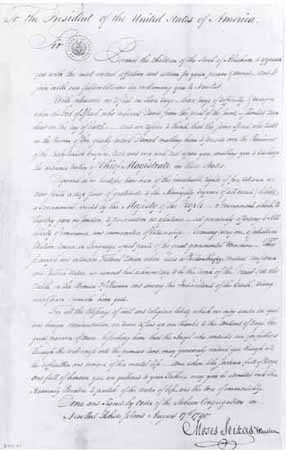 |
Washington's reply is characteristically large-minded and generous:
Gentlemen:
While I received with much satisfaction your address replete with expressions of esteem, I rejoice in the opportunity of assuring you that I shall always retain grateful remembrance of the cordial welcome I experienced on my visit to Newport from all classes of citizens.
The reflection on the days of difficulty and danger which are past is rendered the more sweet from a consciousness that they are succeeded by days of uncommon prosperity and security.
If we have wisdom to make the best use of the advantages with which we are now favored, we cannot fail, under the just administration of a good government, to become a great and happy people.
The citizens of the United States of America have a right to applaud themselves for having given to mankind examples of an enlarged and liberal policy-a policy worthy of imitation. All possess alike liberty of conscience and immunities of citizenship.
It is now no more that toleration is spoken of as if it were the indulgence of one class of people that another enjoyed the exercise of their inherent natural rights, for, happily, the government of the United States, which gives to bigotry no sanction, to persecution no assistance, requires only that they who live under its protection should demean themselves as good citizens in giving it on all occasions their effectual support.
It would be inconsistent with the frankness of my character not to avow that I am pleased with your favorable opinion of my administration and fervent wishes for my felicity.
May the children of the stock of Abraham who dwell in this land continue to merit and enjoy the good will of the other inhabitants; while every one shall sit in safety under his own vine and fig tree and there shall be none to make him afraid.
May the father of all mercies scatter light, and not darkness, upon our paths, and make us all in our several vocations useful here, and in His own due time and way everlastingly happy.
G. Washington
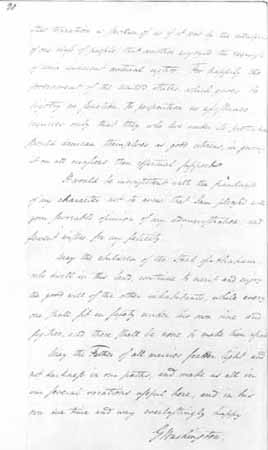 |
To bigotry no sanction, to persecution no assistance became, through its use by the country's first president, a revered phrase in America's national vocabulary.
The publication of the Hebrew Congregations/George Washington correspondence in a number of American newspapers in 1790 constituted a public declaration by the Father of his Country of the free and equal status of Jews in America, furthered by its inclusion in A Collection of Speeches of the President of the United States (Boston, 1796). The usefulness of the Washington pronouncements is illustrated by Governor Worthington employing them in 1824 in support of the "Jew Bill," which conferred upon Maryland Jews the full political rights heretofore denied them.
Sources: Abraham J. Karp, From the Ends of the Earth: Judaic Treasures of the Library of Congress, (DC: Library of Congress, 1991).
